AP Biology Study guides, Class notes & Summaries
Looking for the best study guides, study notes and summaries about AP Biology? On this page you'll find 287 study documents about AP Biology.
Page 3 out of 287 results
Sort by
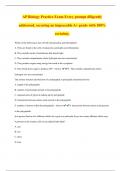
-
AP Biology Practice Exam Every prompt diligently addressed, securing an impeccable A+ grade with 100% certainty.
- Exam (elaborations) • 4 pages • 2024
-
- $2.99
- + learn more
Which of the following is true of both mitochondria and chloroplasts? A. They are found in the cells of eukaryotic autotrophs and chloroplasts B. They include stacks of membranes that absorb light C. They include compartments where hydrogen ions are concentrated D. They produce sugars using energy harvested in the cytoplasm E. They break down sugar to produce ATP - Answer C. They include compartments where hydrogen ions are concentrated The tertiary structure and function of a polypeptide...
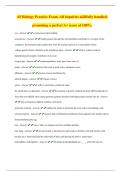
-
AP Biology Practice Exam. All inquiries skillfully handled, promising a perfect A+ score of 100%.
- Exam (elaborations) • 4 pages • 2024
-
- $2.99
- + learn more
yes - Answer is testosterone lipid soluble testosterone - Answer readily passes through the cell membrane and binds to a receptor in the cytoplasm. the hormone and receptor then enter the nucleus and act as a transcription factot voltage-gated calcium channels in the membrane open - Answer what is a direct result of depolarizing presynaptic membrane of an axon oxygen gas - Answer in photosynthesis, atom goes from water to pump - Answer whenever this term is used, active transport occurs d...

-
AP Biology Exam with Answers
- Exam (elaborations) • 17 pages • 2024
- Available in package deal
-
- $14.99
- + learn more
AP Biology Exam with Answers Active Transport - Answer>>The movement of particles across a selectively permeable membrane against its concentration gradient. It requires lots of energy - hence the name "active" transport. Selectively Permeable Membrane - Answer>>A membrane that allows only specific molecules or ions to enter through it through diffusion or facilitated diffusion.
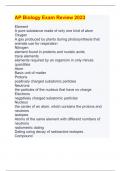
-
AP Biology Exam Review 2023
- Exam (elaborations) • 45 pages • 2024
- Available in package deal
-
- $12.99
- + learn more
AP Biology Exam Review 2023 Element A pure substance made of only one kind of atom Oxygen A gas produced by plants during photosynthesis that animals use for respiration Nitrogen element found in proteins and nucleic acids trace elements elements required by an organism in only minute quantities Atom Basic unit of matter Protons positively charged subatomic particles Neutrons
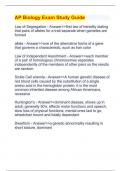
-
AP Biology Exam Study Guide
- Exam (elaborations) • 5 pages • 2024
- Available in package deal
-
- $15.99
- + learn more
AP Biology Exam Study Guide Law of Segregation - Answer>>first law of heredity stating that pairs of alleles for a trait separate when gametes are formed allele - Answer>>one of the alternative forms of a gene that governs a characteristic, such as hair color Law of Independent Assortment - Answer>>each member of a pair of homologous chromosomes separates independently of the members of other pairs so the results are random Sickle Cell anemia - Answer>>A human...
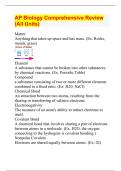
-
AP Biology Comprehensive Review (All Units)
- Exam (elaborations) • 78 pages • 2024
- Available in package deal
-
- $15.49
- + learn more
AP Biology Comprehensive Review (All Units) Matter Anything that takes up space and has mass. (Ex. Rocks, metals, grass) Element A substance that cannot be broken into other substances by chemical reactions. (Ex. Periodic Table) Compound a substance consisting of two or more different elements combined in a fixed ratio. (Ex: H20, NaCl) Chemical Bond An attraction between two atoms, resulting from the sharing or transferring of valence electrons. Electronegativity
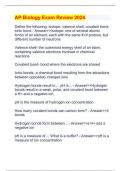
-
AP Biology Exam Review 2024
- Exam (elaborations) • 20 pages • 2024
- Available in package deal
-
- $13.29
- + learn more
AP Biology Exam Review 2024 Define the following: isotope, valence shell, covalent bond, ionic bond - Answer>>Isotope- one of several atomic forms of an element, each with the same # of protons, but different number of neutrons Valence shell- the outermost energy shell of an atom, containing valence electrons involved in chemical reactions
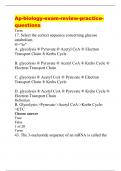
-
Ap-biology-exam-review-practice-questions
- Exam (elaborations) • 10 pages • 2024
- Available in package deal
-
- $15.99
- + learn more
Ap-biology-exam-review-practice-questions Term 17. Select the correct sequence concerning glucose catabolism. ®="to" A. glycolysis ® Pyruvate ® Acetyl CoA ® Electron Transport Chain ® Krebs Cycle B. glycolysis ® Pyruvate ® Acetyl CoA ® Krebs Cycle ® Electron Transport Chain
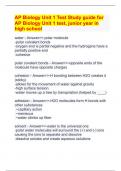
-
AP Biology Unit 1 Test Study guide for AP Biology Unit 1 test, junior year in high school
- Exam (elaborations) • 17 pages • 2024
- Available in package deal
-
- $14.99
- + learn more
AP Biology Unit 1 Test Study guide for AP Biology Unit 1 test, junior year in high school water - Answer>>-polar molecule -polar colvalent bonds -oxygen end is partial negative and the hydrogens have a partially positive end -cohesive polar covalent bonds - Answer>>-opposite ends of the molecule have opposite charges
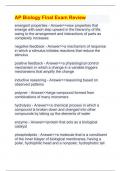
-
AP Biology Final Exam Review
- Exam (elaborations) • 26 pages • 2024
- Available in package deal
-
- $14.99
- + learn more
AP Biology Final Exam Review emergent properties - Answer>>new properties that emerge with each step upward in the hierarchy of life, owing to the arrangement and interactions of parts as complexity increases negative feedback - Answer>>a mechanism of response in which a stimulus initiates reactions that reduce the stimulus positive feedback - Answer>>a physiological control mechanism in which a change in a variable triggers mechanisms that amplify the change

That summary you just bought made someone very happy. Also get paid weekly? Sell your study resources on Stuvia! Discover all about earning on Stuvia


